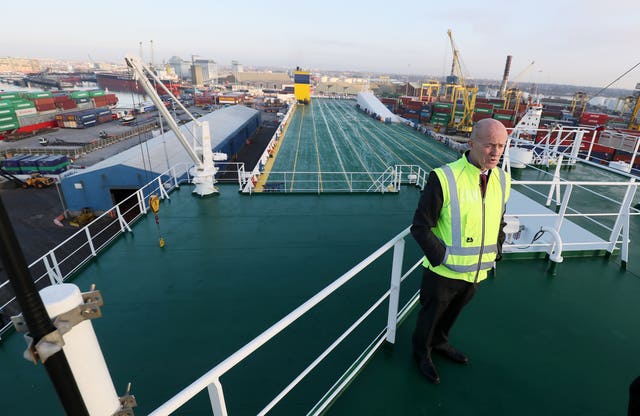Irish shipping industry booming amid Brexit fears
Manufacturers increasingly see Irish ports like Dublin and Rosslare as an alternative to the landbridge.

The Irish shipping industry has seen a marked increase in business as companies bypass British ports amid Brexit fears, the head of Dublin Port has said.
Irish ports have been forced to adapt quickly and increase capacity for direct sailings to continental EU ports as manufacturers increasingly see Irish ports like Dublin and Rosslare as an alternative to the landbridge.
The landbridge is the UK transit route linking Ireland and mainland Europe, and an estimated 150,000 Irish trucks and three million tonnes of goods travel through the UK for export to the EU each year.
Currently, two-and-a-half times more goods move on direct routes from Dublin than via the UK landbridge, and that number is expected to increase.
“We’re starting to see alternatives developing, options over the landbridge as people grow concerned about the issue,” said Eammon O’Reilly, CEO of Dublin Port.
“We’re starting to see more fast moving consumer goods which in the past would’ve been guaranteed access to the Irish market through the UK, we’re now seeing a switch, these goods are coming directly to Dublin from continental Europe.
“Those companies who don’t need to use the UK are beginning to avail of those options, and make sure they have established commercial relationships to be able to move goods no matter what happens with Brexit.

“The shipping industry can adapt very quickly, the one thing Brexit is not going to do, it’s not going to increase the number of goods flowing in and out of Britain.
“So if there are ships going in and out of Britain that don’t have enough business, they can easily run in and out of Dublin.
“The shipping industry can redeploy ships at very short notice to make up any shortfall, and respond to increase in demand.
“The growth in Dublin port has been phenomenal. Over the last six years alone we’ve seen 36% growth, and we anticipate that demand for direct services between Dublin Port and continental Europe will increase further after Brexit.”
On Friday March 29, the original “Brexit day”, the MV Laureline – the second biggest freight ferry to service Dublin – left the Irish capital for the port of Zeebrugge in Belgium.
The third in the fleet from the Luxembourg-based shipping company CLdN to service Dublin, the addition increases the company’s capacity by 20%, bringing the possible number of sailings to seven a week.
A spokesman for CLdN said: “We have taken a long-term view on Dublin Port and invested accordingly.”
The port says the addition of the “super ferry” is a vote of confidence in Irish ports amid the Brexit chaos.
Intensifying discussions between Ireland, the UK and the EU on preparing for the impact of a no-deal Brexit are currently under way.





